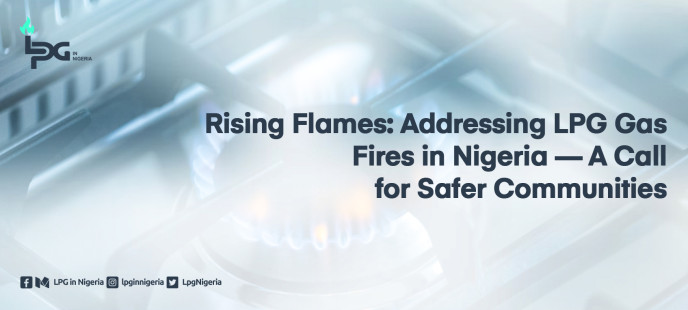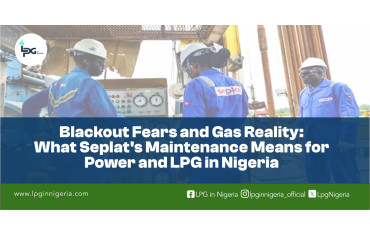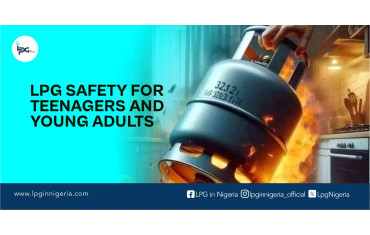- 2783
- 2
Sharing Ideas and Updates on LPG in Nigeria and related information to enable effective collaboration within the LPG Value Chain
Rising Flames: Addressing LPG Gas Fires In Nigeria — A Call For Safer Communities

Nigeria’s push for Liquefied Petroleum Gas (LPG) adoption as a cleaner energy source has gained momentum over the years. However, this growth has been marred by frequent explosions and fires, leaving a trail of destruction in communities across the country. As a platform dedicated to advocating for the safe use of cooking gas, LPG in Nigeria is deeply concerned about the increasing number of gas plants operating dangerously close to residential neighborhoods, posing significant threats to lives and properties.
LPG Plants in Residential Areas: A Disaster Waiting to Happen
One of the most pressing issues is the proliferation of LPG plants in densely populated areas. Across Nigeria, gas plants, refilling stations, and even makeshift gas outlets have sprung up within residential neighborhoods, markets, and schools — often without proper regulatory oversight. These plants operate just meters away from homes and businesses, creating a high-risk environment where a single spark could result in catastrophic explosions.
In recent years, we have seen devastating consequences of these poorly sited gas plants. Take, for example, the Second Coming Gas Company incident, where community members raised alarms about its proximity to residential areas. The risk of such facilities operating near homes cannot be overstated, as the consequences of a leak or explosion could lead to mass casualties, property destruction, and long-term trauma for affected communities.
This explosion where a 50,000-litre gasoline tanker overturned, sparking a massive fire. The fact that such highly combustible materials are transported through densely populated areas highlights the urgent need for stricter safety measures and better urban planning.
The Human Cost: Lives and Livelihoods in Jeopardy
The human toll of these explosions cannot be ignored. In many cases, residents are left to pick up the pieces after losing their loved ones, homes, and businesses. Survivors, like Mojeed Ogooluwa, who lost his source of income after the Otedola Bridge explosion, often receive little to no support in rebuilding their lives.
Moreover, the psychological impact is profound. Living near an LPG plant means living in constant fear of an explosion. Families sleep uneasily, knowing that a gas leak or equipment failure could wipe out their entire neighborhood in seconds. For these communities, the question is not if an accident will happen — but when.
Why Are LPG Plants in Residential Areas?
Several factors have contributed to this unsafe trend:
Weak Regulation and Oversight
Regulatory bodies like the Nigerian Midstream and Downstream Petroleum Regulatory Authority (NMDPRA) and local governments have struggled to enforce zoning laws.
In many cases, LPG plants operate without the necessary approvals or with forged permits.
Profit Over Safety
Entrepreneurs see the growing demand for LPG as a lucrative business opportunity. By setting up plants close to consumers, they reduce transportation costs and maximize profits — at the expense of public safety.
Lack of Awareness
Many community members are unaware of the dangers posed by having gas plants near their homes. Some even welcome these plants, believing they create jobs and improve access to cooking gas.
The Way Forward: Prioritizing Safety in LPG Expansion
If Nigeria is to continue its push for clean energy adoption through LPG, urgent action must be taken to prevent further tragedies:
Enforce Proper Zoning Laws
Authorities must ensure that LPG plants and refilling stations are located in industrial zones, away from residential areas.
Regular inspections should be conducted to ensure compliance, with heavy penalties for violators.
Raise Public Awareness
Educate communities about the dangers of living near gas plants and empower them to report unauthorized facilities.
Conduct regular safety drills and training sessions to teach residents how to respond in case of a gas leak or explosion.
Invest in Safer Infrastructure
Improve the safety standards of gas plants by ensuring proper installation of equipment, regular maintenance, and use of modern leak detection systems.
Strengthen Emergency Response
Equip local fire departments and emergency responders with the tools and training necessary to handle gas-related incidents.
Establish dedicated helplines for reporting gas leaks and unsafe practices.
Support Victims
Provide immediate medical and financial support to victims of gas explosions.
Set up a compensation fund to help survivors rebuild their lives.
No Community Should Live in Fear
At LPG in Nigeria, we believe that clean energy should not come at the cost of safety. As Nigeria moves toward a gas-powered economy, the government must ensure that this transition is safe, sustainable, and inclusive. Gas plants do not belong in neighborhoods, near schools, or in crowded marketplaces. The right to clean energy is fundamental — but so is the right to live without fear of explosions.
The time for action is now. Lives depend on it.
















Wahab Afolabi
19 March 2025 - 08:47amThanks for the awareness
Reply